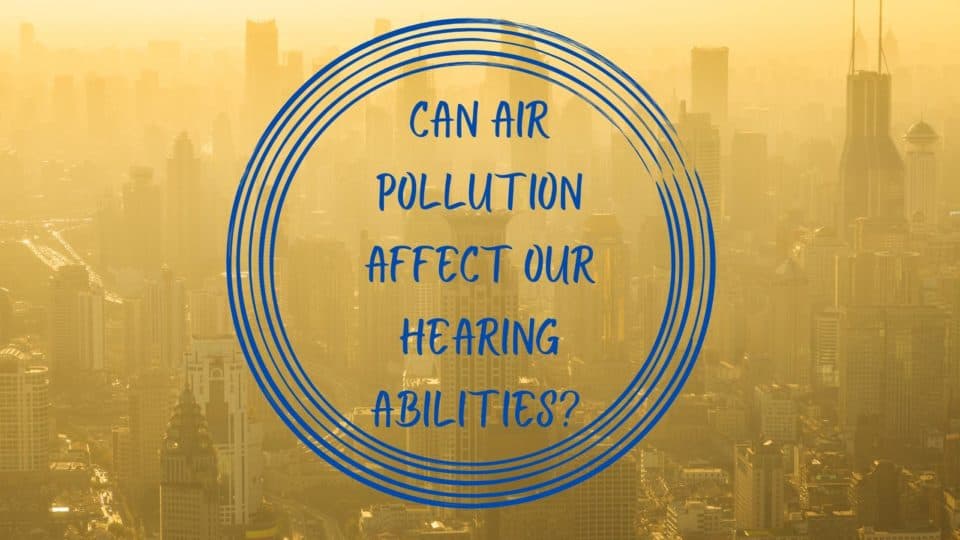- A Closer Look at Common Myths About Hearing Loss - May 7, 2024
- The Impact of Pets on Emotional and Hearing Health - April 26, 2024
- Strategies for Coping with Single-Sided Deafness - April 16, 2024
Loud noise and noise pollution, as we all know, can cause hearing loss. These sounds can harm your ear’s cells, making them difficult to hear. But have you ever considered how the air you breathe may influence your ears? That was the subject of a recent study. Here’s what we’ve discovered about air pollution and how it impacts our ability to hear.
Air pollution study finds a link to hearing loss
A Taiwanese study featured in the International Journal of Environmental Research and Public Health examined the impact of air pollution on hearing. Using 74 ambient air quality monitoring stations around Taiwan, the researchers calculated the annual amounts of carbon monoxide and nitrogen dioxide in the air. Using this method, they figured out which areas had high, moderate, or low levels of air pollution.
The researchers then analyzed the results of a 20-year national health survey of over 75,500 people to check if hearing loss was linked to air pollution.
Researchers discovered that air pollution can result in a persistent sensorineural hearing loss! Hearing loss was much higher in locations with high air pollution than in areas with moderate air pollution. Sensorineural hearing loss was shown to be more common in places with moderate levels of air pollution.
Hearing loss was 1.63 times more common in those exposed to high nitrogen dioxide air pollution levels than in people exposed to moderate pollution levels. Hearing loss rates were nearly the same in high carbon monoxide areas. Those living in these areas had a 1.45 higher chance of hearing loss.
How could air pollution lead to hearing loss?
Toxic compounds in the air are thought to destroy the cells in your inner ear. These sensitive cells are highly vulnerable to injury and oxygen deprivation, and contaminants in the air can deprive them of the oxygen they require to function correctly. More research is needed into how air pollution affects hearing.
Another factor for hearing loss is that air pollution has been related to a higher risk of ear infections. Air pollution, notably nitrogen dioxide pollution, is linked to a higher prevalence of ear infections in children, according to a 2018 assessment of recent evidence. Ear infections usually clear up after a few days or can be treated with medication. Ear infections, on the other hand, might result in irreversible hearing loss.
Cleaner air is about more than cleaner lungs. Air pollution reduction is a critical step toward improving people’s general health and well-being around the world. Hearing loss can be reduced by policies that protect the environment or limit pollution. This would reduce the number of ear infections and the number of cases of sensorineural hearing loss caused by air pollution.
Is it time to treat your hearing loss?
Have you seen any changes in your hearing health recently, whether due to air pollution, an ear infection, or another factor? Hearing loss that isn’t treated has an impact on your ability to hear! Hearing loss caused by damage to cells in the inner ear is known as sensorineural hearing loss. When they are destroyed, these cells stop delivering signals to the brain. You lose your capacity to hear particular sounds.
However, this isn’t the only thing that occurs. The auditory parts of your brain begin to die after a period of inactivity, or they may be repurposed for another system, such as your sense of smell or touch. Early treatment of hearing loss allows you to hear all of the noises around you. It keeps your auditory centers focused on hearing. This lowers your chances of developing more hearing loss.
Come and see us today!
The first step is to gain a better understanding of your hearing health. Schedule a hearing test with us to determine what sounds you can clearly hear and what noises you can no longer hear. This test will determine whether you require hearing aids or if your hearing is normal.
If you have hearing loss, look into hearing aids. We cooperate with the best hearing aid manufacturers in the world to deliver you excellent hearing aids. Today is the day to contact us and let us help find the right hearing aid for you.

